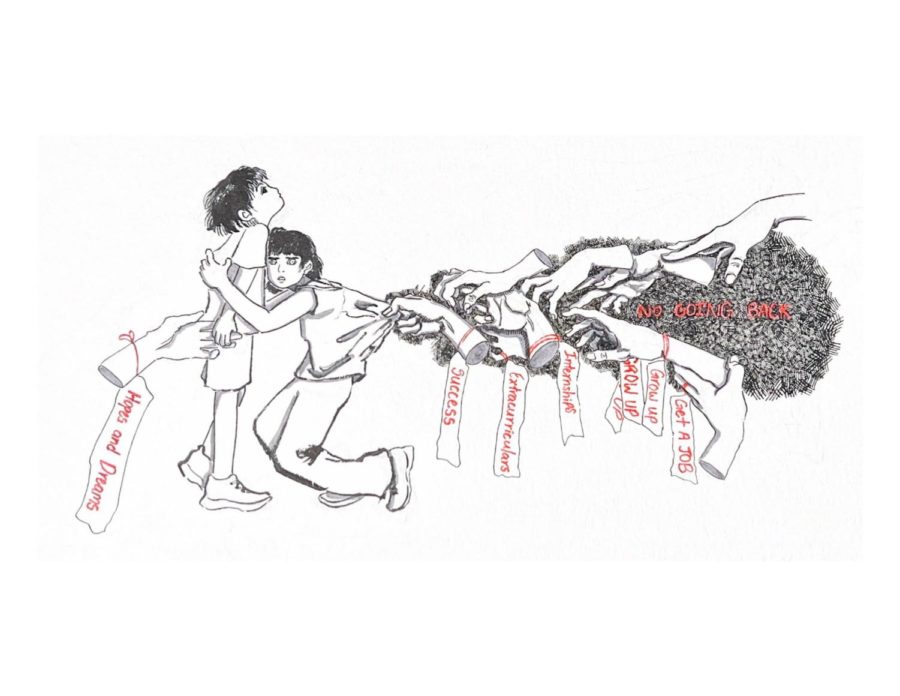Sometimes, a miracle occurs. Phospholipids spontaneously arrange themselves into lipid bilayers; U of C first-years, complete strangers brought together by an application which barely scratches the surface of who they are, somehow organize themselves into circles of acquaintances and friends within their first week together.
Order emerges from chaos.
The last time I encountered such a miracle was my first day of kindergarten. Back then, I was generally happy to play with any and all other kids, and the thought “How will I make friends?” did not cross my mind. I was convinced that everyone would be everyone’s friend. Approaching the first day of college with a newly heightened sense of self-consciousness, I was decidedly less convinced of this former belief.
Yet, somehow, despite some anxiety, I ended up with some friends by the conclusion of the first week. Even though only a few weeks have gone by since, if someone asked me how and when any one of those friendships was formed, I don’t think I would have a clear answer.
I find that my thoughts on friendship echo a certain U of C T-shirt: “That’s all well and good in practice…but how does it work in theory?”
Erich Fromm, a social psychologist, sociologist, and philosopher, wrote the following in his book The Art of Loving: “Our whole culture is based on the appetite for buying, on the idea of a mutually favorable exchange. For the man an attractive girl—and for the woman an attractive man—are the prizes they are after. ‘Attractive’ usually means a nice package of qualities which are popular and sought after on the personality market….Two persons thus fall in love when they feel they have found the best object available on the market, considering the limitations of their own exchange values.”
Although Fromm is speaking specifically about romantic love, I believe that his ideas can be applied to friendship as well. It seems awfully cynical to relate love, which we have been taught to value and revere, to a simple matter of economics, or to think that we can attach a ‘social value’ to individuals. We are all familiar with this idea, though, perhaps most so when we note our own imperfections in the bathroom mirror each morning. We also cannot deny the judgments we immediately pass on people from a single cursory glance.
When I walked into my first class, I did not have the opportunity to get to know every person in that room, or even to greet all of them. In fact, I was only able to glance at them. For all of us, time and attention are in finite supply, and we must make a decision about how and where we will spend them. So, how do we make the choice?
Is it random? The Class of 2016 is a little less than 27 percent Asian, so, in theory, I should have a similar percentage of Asian friends. My number is closer to 60 percent, if not higher, probably due, in large part, to my own Asian identification. I don’t think I’m prejudiced in any way, but a combination of factors—a subconscious feeling of belonging, a socially ingrained instinct from some instances of racism and rejection—have led me to judge those people as deserving of my time and energy. And I would wager that very few students of any race can claim that their friend groups correspond exactly to the University demographics—based on racial identification, economic status, sexual orientation, or any other category.
The above example is enough to prove that our selection of friends isn’t random and is influenced by how we judge people’s physical appearance, but can we go as far as Fromm does, and claim that we select friends based off their “socially competitive quality packages?” I think we can.
On my fourth day of Gen Chem, I sat down in my usual seat a couple of minutes before class began. The girl who sat next to me, with whom I’d only ever exchanged names, leaned over and asked me to explain a problem. It was a difficult problem that had been squeezed into the end of our last lecture, but, fortunately, I was able to work it out and explain it to her. Immediately after, she asked for my phone number. At least three other students sitting around me asked for my number, as well, and over the next couple days we became friendlier with each other. Something similar happened in my math class.
I saw Fromm’s model of social interaction working in these instances: I offered a service (math or chem help) that others found to be valuable, and they repaid me with their attention and time.
Fromm condemned the capitalistic beginnings of love, and I find myself somewhat apprehensive about them, too. I, and many others, often feel that the factors that make individuals less competitive socially are beyond their control (physical appearance, which is closely related to race, is an example of this).
Even the factors that were in my control leave a slightly bitter aftertaste in my mouth. I am an individual with interests and passions and dreams, and in the universe of myself, my CHEM 111 abilities are the slightest dust speck. And yet, even among friends, I sometimes wonder if they would have paid the slightest attention to the rest of who I am if it weren’t for my ability to explain problem 49b.
Eleanor Hyun is a first-year in the College majoring in English.








